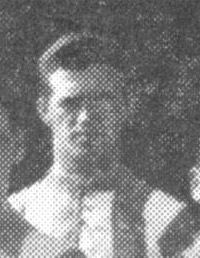

Robinson: David (Dave)
1926-1928
(Player Details)
Left Back
Born: Longtown: 04-07-1900
Debut v Blackburn Rovers (h): 09-10-1926
5’7” 11st 6lb (1928)
Early in his career it looked as though Robinson would not make the grade. He began with
Lockerbie and was rejected by Aston Villa after trials. After playing with Non-League club
Eskdale, he signed for Carlisle United, then also a Non-League club. They converted him into
a full back before joining Leeds in May 1926, via other Non-League clubs, Solway Star and
Workington. United had three very well established full-backs in Harry Roberts and Bill
Menzies, with Jimmy Allan as a reliable deputy for either. So there was very little scope
for the twenty-six year-old Robinson, but he did make four appearances in the 1926-27
campaign at left-back as Bill Menzies’ deputy. There was another final appearance in the
following season, again as a replacement for an injured Bill Menzies, but his chances had
become even more limited with the return of centre-half stalwart Ernie Hart and the moving
of Captain Tom Townsley to right back to accommodate him. With Townsley and Menzies almost
ever-presents and Jimmy Allan the acknowledged cover for both full-back positions, he moved
to Southend United in May 1928. At last he found his niche, making over three hundred
appearances for the Shrimpers, despite a bad injury in February 1933. He became a legend at
Roots Hall and his full record was a very impressive three hundred and seventeen League
games, twenty-four FA Cup appearances and seven in other matches. He did score just one goal
for the Shrimpers but he had to wait until his final season of 1938-39 before scoring it. He
also got to play at Wembley but not under the usual circumstances as this attachment
explains.
(Attachment) (Unfortunately the attachment no longer works! However, the following is an
account of the circumstances: The idea of Wembley being used by the lesser lights was not a
new one. A prospective London based club called Argonauts were able to give assurances that
Wembley would be their home ground when they unsuccessfully applied to the Football League
in 1928, 1929 and 1930. Clapton Orient (the predecessors of modern day Leyton Orient)
had moved into a new ground at Lea Bridge Road, Hackney at the beginning of the 1930 season.
Unfortunately, the arena was bounded by a speedway track which was too close to the pitch
and as the playing area was already the minimum permitted in width, structural alterations
had to be made which meant the ground could not be used while the alerations were being
undertaken. Orient unsuccessfully approached both Leyton FC and Walthamstow Road, their
close neighbours, regarding temporary use of their grounds. This left Wembley as the only
option. So on 22nd November 1930 the seventeenth placed Orient played their League Division
Three (Southern Section) fixture eith third placed Brentford in front of a crowd of 8,319
or 10,300 and the game finished Clapton Orient 3 Brentford 0. The teams were Clapton Orient:
Arthur Wood; Ernie Morley, Tom Evans; Eddie Lawrence, Jack Galbraith, Jimmy Bolton; Rollo
Jack, Arthur Cropper, Reg Tricker, Jack Fowler, Charlie Fletcher. Brentford: Fred Fox; Alex
Stevenson, Tom Adamson; Reg Davies, Jimmy Bain, Harry Salt; Jack Lane, Jackie Foster, David
Sherlaw, Cecil Blakemore, Bill Berry. The scorers were: Tricker and Cropper (2). The Daily
Herald commented unfavourably on the "quagmire" of a pitch. Orient's next game was an FA Cup
replay against Luton Town that was played at Highbury, but they returned to Wembley for their
next home League match in sixteenth position in League Division Three (Southern Section)
against the fourth placed Southend United, on 6th December 1930 in front of a crowd of 1,916.
The score was: Clapton Orient 3 Southend United 1. The Teams were: Clapton Orient: Harry
Blackwell; Ernie Morley, Billy Broadbent; Eddie Lawrence, Jack Galbraith, Jimmy Bolton; Rollo
Jack, Arthur Cropper, Reg Tricker, Jack Fowler, Charlie Fletcher. Southend United: Billy
Moore; Jackie French, Dave Robinson; Bob Ward, Joe Wilson, Bill Johnson; Fred Barnett,
Mickey Jones, Jimmy Shankly, Dickie Donoven, Arthur Crompton. The scorers were: Fowler (2)
Jones and Tricker. After the Wembley adventure Orient's next home game, a 2-0 win over
Norwich City was played at Lea Bridge and was watched by 3,359.) Robinson continued to play
for Southend until after the outbreak of World War Two when injury forced his retirement in
1940. He scored three times in thirty games in the 1939-40 War-time League. Such was the
stature of the Scot, Dave Robinson, in the history of the club that he had his first
testimonial match in 1934, when David Jack came to watch and was persuaded to join the
Shrimpers as Manager, and his second, on retirement in 1970. Five foot five but as hard as
nails, he went on to become a fixture at Southend being Assistant Trainer for thirteen years
under Wilf Copping and Wilf Dixon. After he retired from the coaching staff he was appointed
Southend’s groundsman and gave his usual unstinted dedication until his retirement in 1970.
He also ran a newsagents and tobacconists in the resort. He was still helping out at the
club when he died in 1986 aged eighty-six, having spent nearly sixty years with the club. A
minute's silence was observed at the home game immediately after his death. He was
apparently “a bit of a lad”. I am indebted to David Robinson’s grandson Peter, and his
friend Derek Elmore, for several vital pieces of information and the little ‘anecdote’ from
a Southend United website, which follows: “J is for Jail Birds - In September 1934 Joe
Wilson, Dave Robinson and Bert Jones were in court accused of poaching. Police stopped their
lorry and found sixty-two rabbits and four guns. Wilson was fined £1 and the others 10/-,
and their guns were confiscated.” (Attachment)